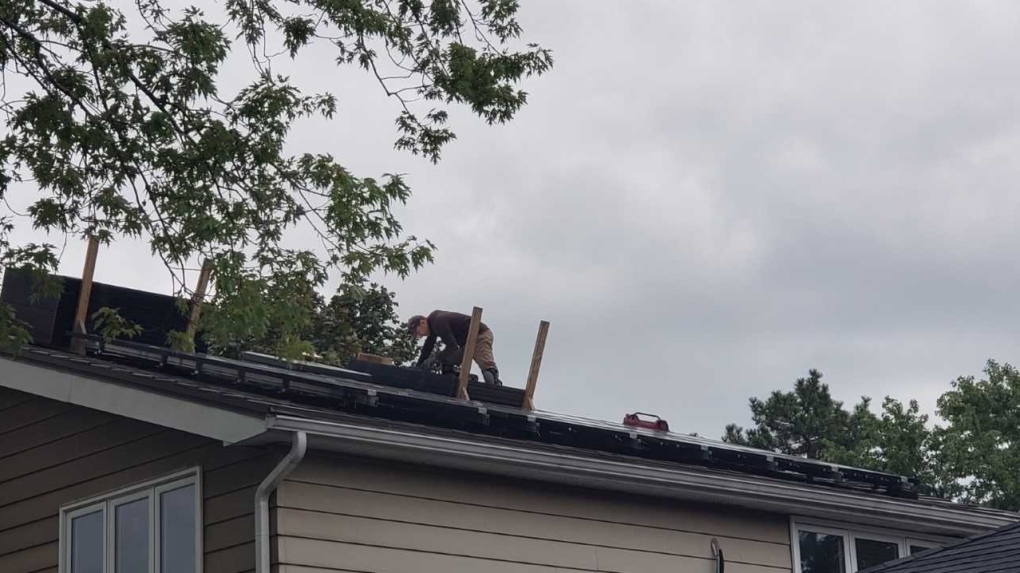Golf ball causes $6,000 damage to Ontario home owner’s solar panels
There are benefits to living beside a golf course as you can enjoy the open green spaces, beautiful views and manicured landscaping.
However, 89-year-old George Hancocks of Scarborough, Ont., says there are drawbacks too.
“I think there are some pretty bad golfers out there, that’s for sure,” Hancocks said.
Hancocks says he has lived beside the Tam O’Shanter Golf Course in Scarborough, which is owned by the City of Toronto, for more than 50 years and there have been plenty of times when errant golf balls have struck his home breaking windows and denting his cars.
Hancocks said he doesn't often complain about balls hitting his house.
However, he said recently he had solar panels installed on his roof to make his home more energy efficient and in August 2021, a golf ball smashed a solar panel on his roof that short circuited the entire system.
“A wild golf ball came down and hit one of the solar panels and completely destroyed the panel,” Hancocks said.

The cost to replace and repairs the panels came to $6,000.
Hancocks contacted the golf course and filed a claim to have the city pay for the repairs, but following an investigation by the Insurance Company ClaimsPro, his claim was denied.
"In order for you to be successful against the City Of Toronto, you must prove the city was negligent. Please note there is an inherent risk in owning a property located in close proximity to a golf course," the claims adjuster said. "Therefore we can find no negligence on the part of the City of Toronto and your claim has been denied in full.”
Golfers tee off not far from Hancocks’ home and he says a screen or netting could be installed to stop balls from hitting his home and others in the neighborhood.
Hancocks said he feels the golf course is responsible for the damage and he has been trying for the past nine months to get the city to pay for the repairs.
"When golf balls hit and damage your house to the tune of $6,000 that's no joke," Hancocks said.
CTV News Toronto reached out to the golf course on Hancocks behalf, and a spokesperson for the insurance and risk management department with the City of Toronto said the adjustor came to the wrong conclusion.
“In this case, the adjustor came to the wrong conclusion with respect to liability," the spokesperson said. "Generally speaking, because the city recognizes that a nuisance was created, the city and its claims adjusting firm usually takes the necessary steps to resolve claims of this nature.”

“Usually, claimants escalate disputes to ClaimsPro senior management. Unfortunately, this did not occur in this instance and so it was not brought to the city's attention until now. Now that this claim has been brought to the city's attention, the city has reviewed the decision made by the adjustor and brought the error to the attention of the claims adjusting firm. ClaimsPro has contacted the claimant to inform them that the claim will be resolved.”
“The city has taken steps to ensure that the adjusting firm and all of its adjustors are aware of the appropriate position to take with respect to liability to prevent similar situations from occurring in the future.”
Now that the city has agreed to pay the $6,000 repair bill, it came as a great relief to Hancocks.
“Having this $6,000 paid now is wonderful and I really appreciate it. I’m very happy” said Hancocks.
It is not always clear who should pay if a golf ball hits a home. The golfer could also be liable if they were being irresponsible, but courses should also take precautions to keep neighbouring homes safe from being hit.
CTVNews.ca Top Stories

Budget 2024 'likely to be the worst' in decades, former BoC governor says
Without having seen it, former Bank of Canada governor David Dodge believes that Tuesday's 2024 federal budget from Deputy Prime Minister and Finance Minister Chrystia Freeland is 'likely to be the worst budget' in decades.
What's at stake for Canada after Iran's unprecedented attack on Israel
Following the Iranian missile and drone strikes against Israel over the weekend, Canada should take the threat of Iran and potential escalation of the conflict seriously, one global affairs analyst says.
Former B.C. school trustee's 'strip-tease artist' remark was defamatory, judge rules
A controversial former school trustee from B.C.'s Fraser Valley who described a political rival as a "strip-tease artist" during an election campaign has been ordered to pay her $45,000 for defamation.
'A sense of urgency': Sask. man accused of abducting daughter calls himself to the stand during trial
Michael Gordon Jackson, the man on trial after being charged with contravention of a custody order for allegedly abducting his daughter in late 2021 to prevent her from getting a COVID-19 vaccine, called himself to the stand Monday.
Kingston, Ont.'s Aaliyah Edwards drafted into WNBA
After four years at the University of Connecticut, Edwards was selected sixth overall by the Washington Mystics in the WNBA draft Monday night.
NASA confirms mystery object that crashed through roof of Florida home came from space station
NASA confirmed Monday that a mystery object that crashed through the roof of a Florida home last month was a chunk of space junk from equipment discarded at the International Space Station.
A knife attack in Australia against a bishop and a priest is being treated as terrorism, police say
Horrified worshippers watched online and in person as a bishop was stabbed at the altar during a church service in Sydney on Sunday evening.
Body of 14-year-old boy pulled from Lake Ontario, police say he drowned while swimming
The body of a 14-year-old boy has been pulled from Lake Ontario after police say he drowned while swimming near Ashbridges Bay Park on Sunday night.
'Rust' armourer gets 18 months in prison for fatal shooting by Alec Baldwin on set
A movie weapons supervisor was sentenced to 18 months in prison in the fatal shooting of a cinematographer by Alec Baldwin on the set of 'Rust.'
































